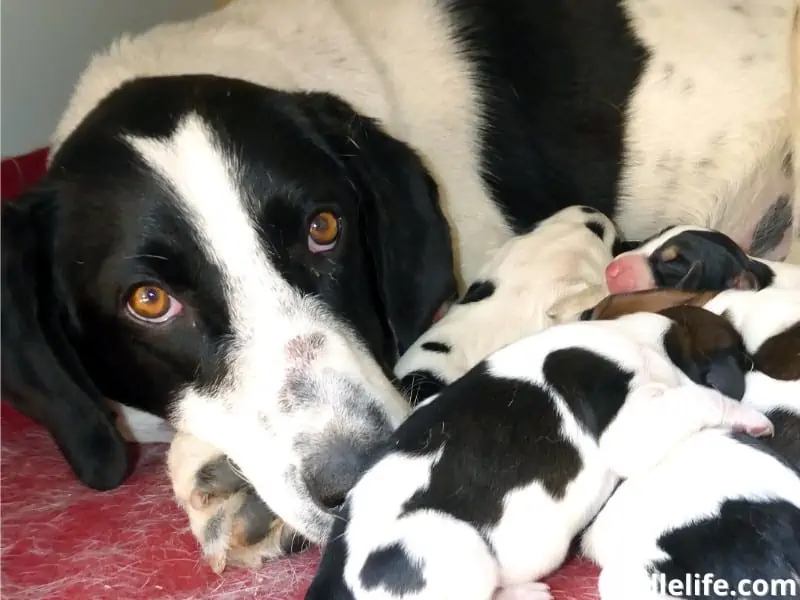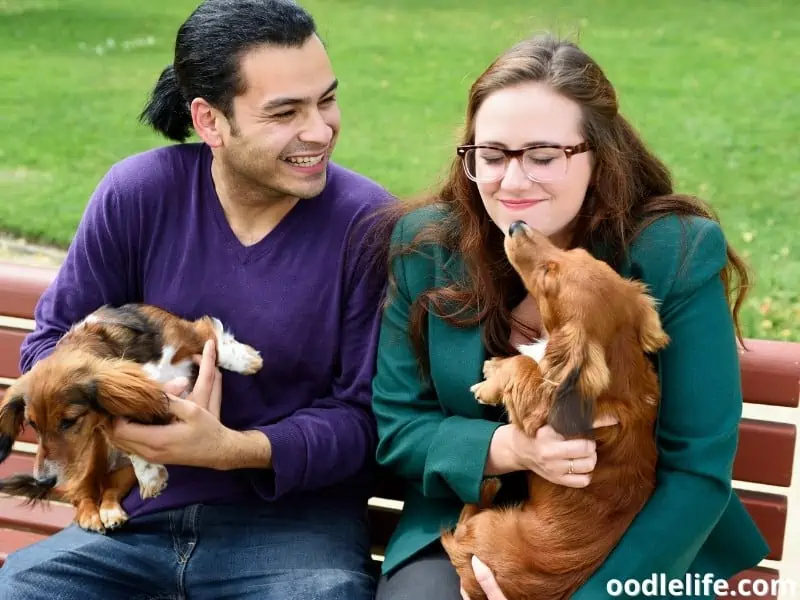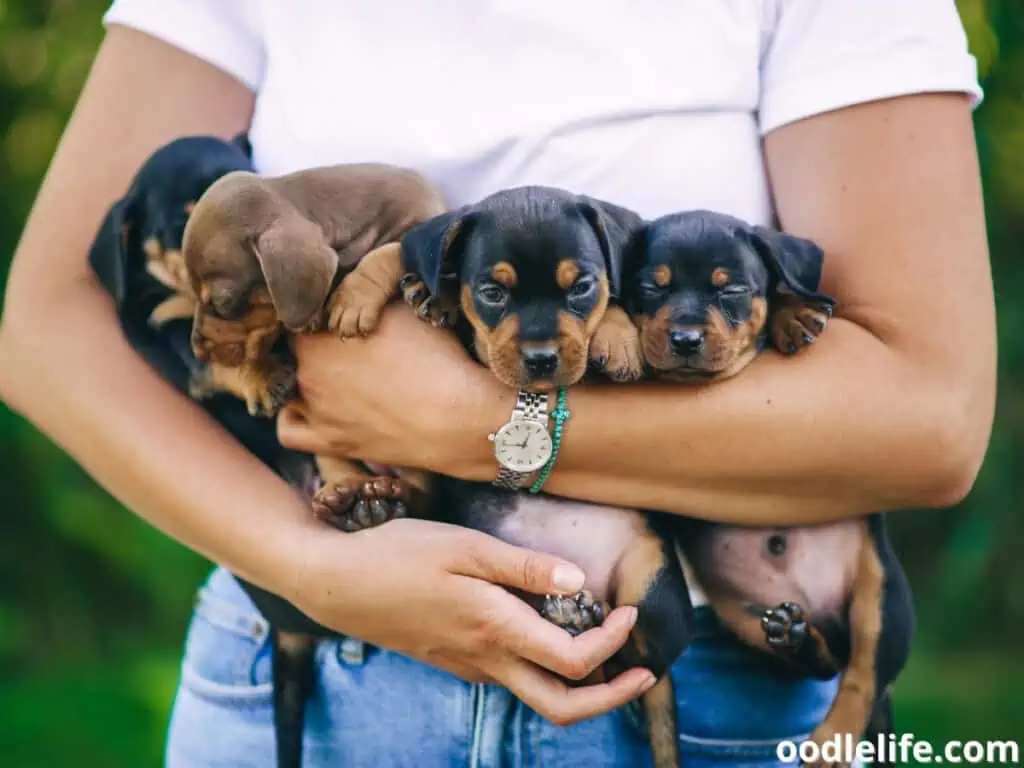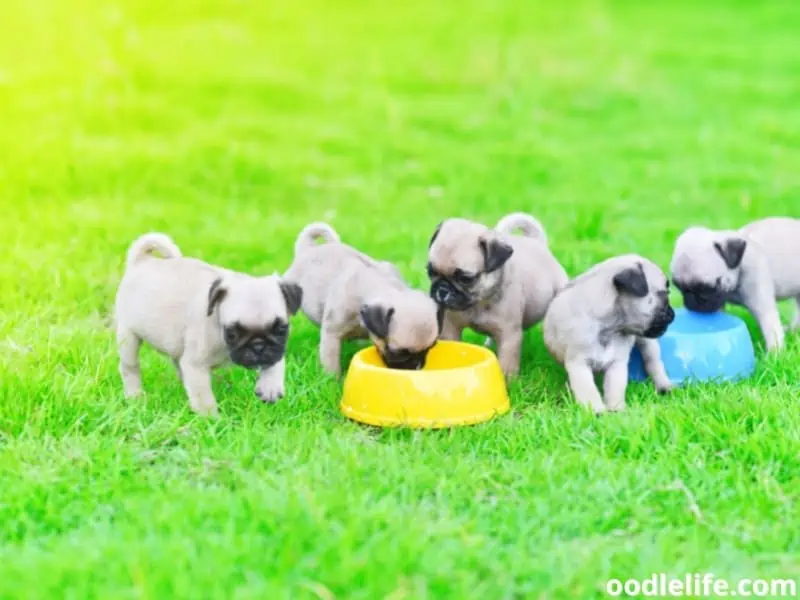How to Pick a Puppy from a Litter?
It can be a tough decision to make knowing when the right time to get a puppy is. Once you’ve decided you’re ready to fill your home with potty accidents and the 7 pm evening zoomies every puppy seems to inherently come with, you have to decide what kind of puppy.
Choosing a breed that suits your lifestyle is vital to make sure you can get the best out of your new family member.
The decisions don’t stop there, once you’ve decided on the breed you have to find a breeder and then choose your puppy to take home. This puppy will live with you for the rest of its life so it’s important to know what you’re looking for to get it right.

Learning what to look for in a puppy and what certain behaviors might translate to when they’re older will give you some clues when it comes to picking your perfect pup.
When you view a litter of puppies, remember you are not obliged to take one home if they don’t look active and healthy or raised in a good, loving environment. You want a puppy who has had the best start in life.
Watch the litter interact with each other
Before you even start to interact with a litter of puppies, you can often tell a lot from the way they interact with each other or with their mother. Even the way they sleep can be telling of certain characteristics.
In a sleeping litter, there are often two varieties of puppies. There are the ones who pile on top of each other and sleep in a big crush and then there are usually the odd one or two who can sleep happily without even touching his or her littermates.
Very young puppies who can sleep alone are often more confident than their siblings. Most litters will take comfort from each other but there are always a few individuals who might separate themselves.

Litters also play and bicker, it’s a natural part of their socialization. If you’re able to witness any of this then it helps to pick out the different personalities. There’s usually a puppy who starts most of the quarrels and rough play sessions, they’re the more confident puppy.
These puppies can have quite the independent streak and do well either going to live with another dog to help socialize them and keep their manners in check or to a home that loves the challenge of a strong-willed little pup.
Some puppies just go with the flow, they’ll play when the others are playing and may react in a little fallout but don’t generally start them.
Some puppies can be more sensitive and cry when they get involved with particular rough play or go to their mother for support quite often. These puppies will often become the kind of dogs to stick to you like glue and need a bit more of a robust socializing period where you get them used to environmental stimuli so they don’t become shivering wrecks at the world.
Health check
No matter the personality of the puppy you’re looking for, you will want to make sure that whatever puppy you get is free of any major health concerns. Beyond making sure you get all the relevant proof of health and genetic testing from the breeder, you should take a look at the entire litter and the mother to make sure you see no major health concerns jumping out at you.
The mother should have a nice glossy coat, her skin should be healthy and there should be no discharge around her eyes or nose. She should move freely around with no discomfort.
It’s sometimes normal for the mothers to lose a little bit of weight while feeding pups which is why they should be changed to puppy food to get extra protein in their diet and help give them lots of energy to deal with a litter of unruly kids with needle-sharp teeth! The puppies should be similar to mum, moving easily with no discharge or obvious discomfort.
When puppies feed it’s normal for them to get a little bit round but if they’re super pot-bellied this could indicate a parasite infestation.

Interacting with the litter
When you finally come to interact with the litter, don’t just rush in and pick out the one that’s most physically appealing to you and cuddle it. Take your time. Some puppies might rush toward you while others will like to assess the situation and let their siblings take the lead.
Some of the litter might even be cowering and shy when you first meet them. Those who come forwards first are generally the more confident puppies. They usually develop into brave adults who will try new things while the more quiet puppies may be a little shyer.
If you lead a quiet life and want a dog to be your companion, sometimes a shy puppy might be your better option. Shy puppies will often look to their owners for a lot of guidance so it’s not always a negative trait to see in a puppy!
Puppies will interact with you in different ways, some might just want to sit near you while they play with a toy, and others will want to climb all over this new and interesting person. Then there are the little rascals who want to put their sharp little teeth all over you and pull at your clothes.
If you have young children, you may want to consider a slightly quieter pup, one that gives you endless kisses instead of trying to steal your shoe laces.
If they try to steal yours then there’s a good chance your children’s toys and dinner might just see the same end!

How they respond to handling
Once you’ve watched them interact with each other and then engaged in a bit of play with you, you will probably want to see how they are being physically handled.
While it’s important to have a pet that enjoys attention, their personalities can be vastly different. If you have young children, no matter how hard you try there’s probably going to be some amount of clumsy or rough handling.
A puppy who doesn’t like its paws touched or cries if you touch its ears most likely won’t be suitable for living with children. A puppy who seeks out touch and thinks that all attention is good attention is more than likely going to be your best choice.

Noise sensitivities
Noise sensitivity is often overlooked when you’re picking a puppy. Anyone that ever gets a dog to be a working dog will be well used to this test to make sure they don’t get a puppy that spooks easily. If you live in a relatively quiet home with no children or too much activity then having a sensitivity to noise won’t be such a deal-breaker.
You can do a lot of noise desensitization training that can help overcome these sensitivities but if you’re looking for a child-friendly pup or one that can be trained to become an assistance dog, this can indicate quite a low anxiety threshold in your pup.
Drop something near the puppies, far enough away to not startle them too badly but close enough to surprise them a little. Usually, something metal like keys on a hard floor is perfect for this. If a puppy doesn’t startle and just looks for the source of the noise, you have yourself a confident little pup.
Some may take longer than others to recover which gives you an idea of how quickly they can overcome stress.

Genetics
While you can spend all day testing a litter and handling them to try and understand their personalities, research tells us that a puppy’s personality has much more to do with genetics than we first thought.
When I worked in rescue, we had a litter of Bulldogs whose mother had quite a severe fear of new people. Despite robust socialization, while they were babies, within a year most of those puppies were having behavioral support for the same issue.
If you can, try to meet the parents. If the breeder only has a mum that’s okay but if they have both mother and father, even better. The parents will give you a great indication of how the puppies will turn out.
Conclusion
When you meet a litter of puppies, it’s hard to avoid melting into a puddle on the floor and insist on taking every single one. It’s also a challenge not to just pick the one with the prettiest eyes or the funkiest coat.
Personality plays such a big part in how suitable a puppy is for your household, you should take the time to get to know them as individuals if you can.
Some puppies might appear brave but the second you pick them up and take them away from their siblings, they might lose all confidence.
Often breeders are more than willing to try to help match your lifestyle to the right puppy as they would have known them since birth and know their quirks. This one important decision is the last hurdle to getting your new puppy home, then the almost two years of puppy and adolescent behavior can begin!
